Forget all that strength training, campusing and hangboarding you’re doing. If your climbing shoes aren’t sticky, or your palms and fingers are greasier than a Kentucky hippie’s taint in August, you are going to have a much harder time staying on the rock. In other words, Yer Gonna FALL!
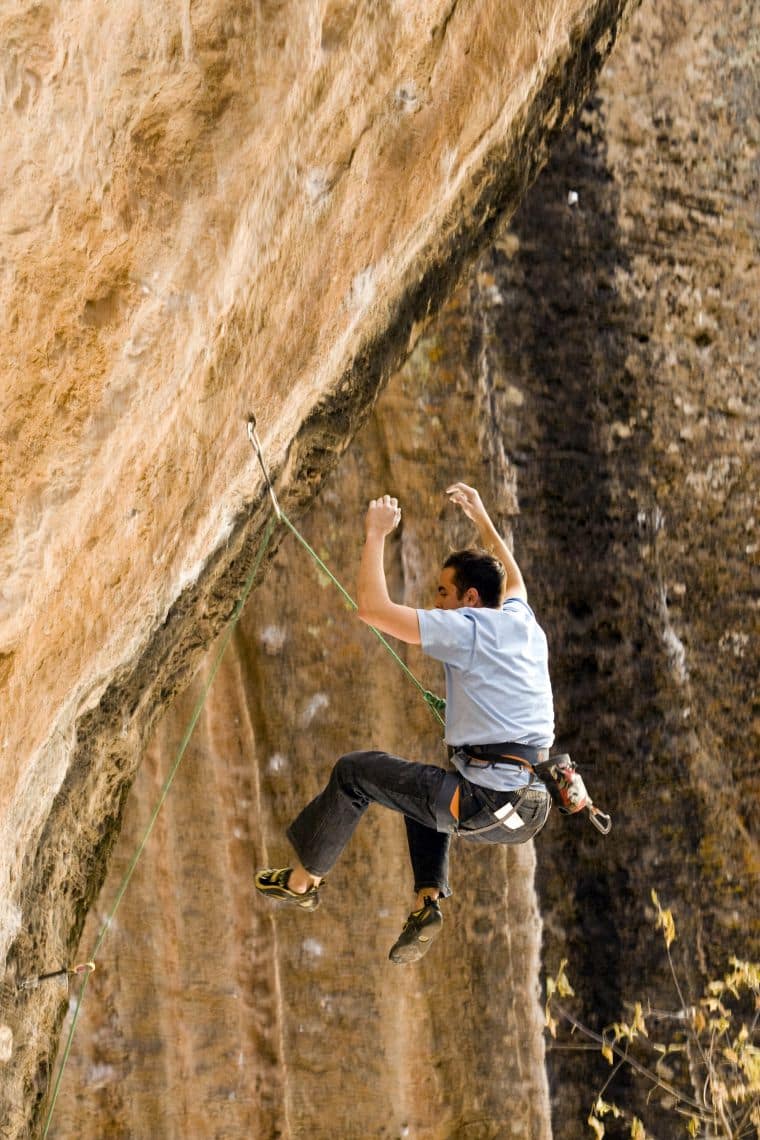
The technology behind climbing-shoe rubber has progressed by leaps and bounds in the last 30 years, mostly in response to a highly informed consumer base that has demanded the stickiest rubber possible. Today, all climbing rubber is relatively quite good, with some brands such as Five Ten and Vibram standing out (in my opinion) as exceptional.
Chalk, however—which, in this context, can be thought of as “shoe rubber for our fingers”—has been relatively ignored by climbers. There seems to be a common assumption that all chalk is the same.
Au contraire, my little cabbage heads!
Like most climbers, I’m willing to go to great lengths to discover and employ both techniques and equipment that will yield for me even the most infinitesimal gains in performance. Why? Because so often the difference between falling and sending is that extra 2 percent.
I’ve experimented over the years with finding ways to increase my skin performance, doing everything from making a house rule to never do dishes the morning before a climbing day (and to use dish gloves otherwise), to more climbing-specific tips like working in a few rounds of Antihydral several times per year, to using Mammut Liquid Chalk (especially in humid conditions), and so on.
But one thing I’ve never really considered is the brand and quality of my chalk. I’ve always just assumed it’s all the same, and since I go through chalk by the bucket load, I’ve always gravitated toward using whatever I can get the cheapest deal on which, usually, is Frank Endo chalk—the stuff that nearly all gymnasts use and costs roughly $2 per block (2 ounces).
That all changed when the founders of Friction Labs, a new chalk company based in Denver, Colorado, reached out to me with the bold claim that they make the best, and purest, climbing chalk and if I started using it I would DEFINITELY send my project!
OK they didn’t actually say that last part, but that’s what I heard in my head.
I was intrigued, if skeptical, and volunteered to put their proprietary blend of magnesium-carbonate to the test, feeling pretty confident that I wouldn’t notice any real difference.
Wow, was I wrong! This chalk is awesome. The best compliment I can give to Friction Labs is that I didn’t even notice or really think about their chalk while climbing. I was focused just on the route and the movement, not on how my hands felt. I realized I had to chalk up way less, and my hands never felt greasy or wet (which sometimes they do and I have to wipe my hands on my pants before going for another dip of the bag).
.After going fully a muerte on one burn to reach the chains on the crag warm-up, I lowered, looked down and was totally surprised to see bone-white palms.
Over the years, I’ve tried it all and never really had much of an opinion. The only chalk I didn’t like was Metolius Super Chalk, which seemed to be rather inconsistent in its quality: Some of the bags I’d buy were great; others, however, left me feeling extremely greasy. Today, I stick with Frank Endo blocks. Cheap, tried and true.
The real confirmation that Friction Labs chalk was superior to my Frank Endo chalk was when I asked about six friends to do a blind test, rolling/crushing one pebble-sized grain of each respective brand between their thumb and index/middle fingers. It was universally agreed upon that the Frank Endo chalk left a relatively slippery/greasy feeling, while the Friction Labs chalk felt much drier and even sticky. Indeed, after several minutes of just milling around the crag, the Frank Endo chalk had worn off the skin of most of my friends, while the Friction Labs chalk remained.

Keah Kalantari and Kevin Brown
Kevin Brown and Keah Kalantari are the two mad scientists behind Friction Labs, which they founded last January. The science behind their product is quite interesting and I’ll try to explain it briefly, though their website also does a great job of explaining this as well.
Kevin Brown started climbing at Devil’s Lake, Wisconsin, 20 years ago. He moved to Denver for a job and to be closer to bouldering at Mt. Evans, his favorite area. He was also one of the founders of the Denver Bouldering Club co-op. Recently, Kevin, a self-proclaimed “science geek,” began researching what chalk is made of and discovered that it contains three major components: magnesium-carbonate, calcium-carbonate and calcium-sulfate.
“When I searched on the difference between magnesium-carbonate and calcium-carbonate,” says Kevin, “I found references to calcium-carbonate being ‘chalk board chalk’ and that it gets slimy when wet.”
Kevin continued his research, and found a chemist from Texas who had noted that magnesium-carbonate traps water inside of its crystalline structure, while calcium-carbonate attaches water on the outside of its structure, thus perhaps explaining that slippery/slimy feeling.
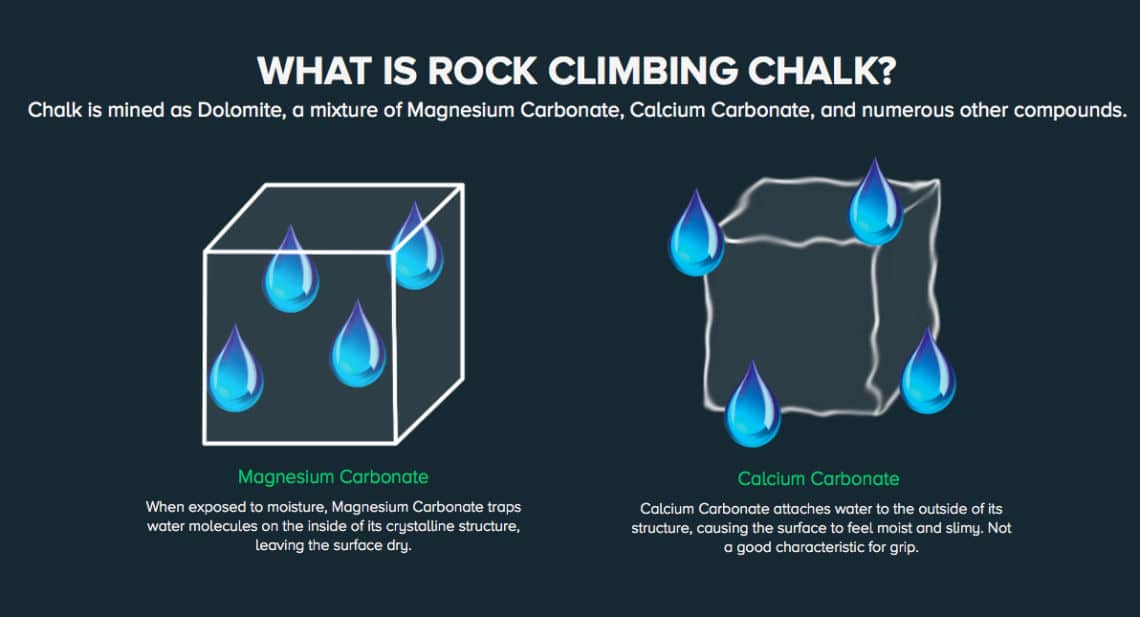
Friction Labs claims that what makes their chalk superior is its higher ratio of magnesium-carbonate (the dry stuff that keeps water inside its molecules) to calcium-carbonate, calcium-sulfate and other impurities (the slippery stuff that keeps water outside its molecules).
This claim is based on a study they conducted in which they sent chalk samples to a lab to have each chalk sample tested using Xray fluorescence, which is a process that can determine how much magnesium-carbonate, calcium-carbonate and other stuff is in each blend. The study shows that Friction Labs has the highest ratio of magnesium-carbonate to the other stuff.
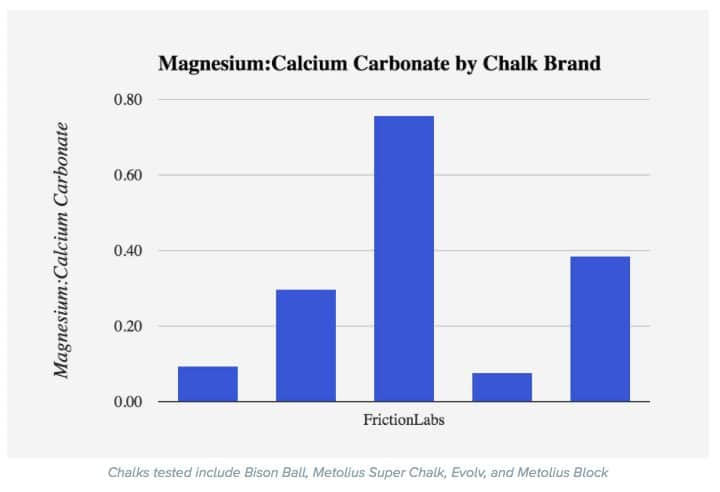
This study doesn’t really have a huge impact on me because of the obvious reason (that it was funded by the very company who comes out looking best), but also because it doesn’t attribute the other results. It keeps the results anonymous—only mentioning which brands were included in the test, but not how each one fared, something I’d like to know.
That said, I don’t really care because my own real-world tests found that Friction Labs chalk is the best chalk I’ve used.
Question is, do I like Friction Labs chalk enough to become a customer?
I’m not sure. Their chalk is expensive. First of all, to get the best deal on their chalk, you have to sign up for a monthly delivery plan in which you commit to buying a certain amount each month. A small 2.5-ounce bag is a whopping $8/month! To give this context, a 2.5-ounce bag is roughly the equivalent to one block of Frank Endo chalk (sub $2)—in other words, over four times as expensive as what I use now.
The more you buy, the more affordable Friction Labs gets. A 7.5-ounce bag (the largest size offered) will cost $14/month, which comes out to just under $2/ounce—better, but still twice as expensive as a block of Endo.
The other major critique I have of Friction Labs is that their chalk doesn’t come in normal blocks. It arrives pre-crushed in one of three particle sizes, all of which are given these fun names: Bam Bam (coarse/chunky), Gorilla Grip (medium-chunky), Unicorn Dust (finest powder).
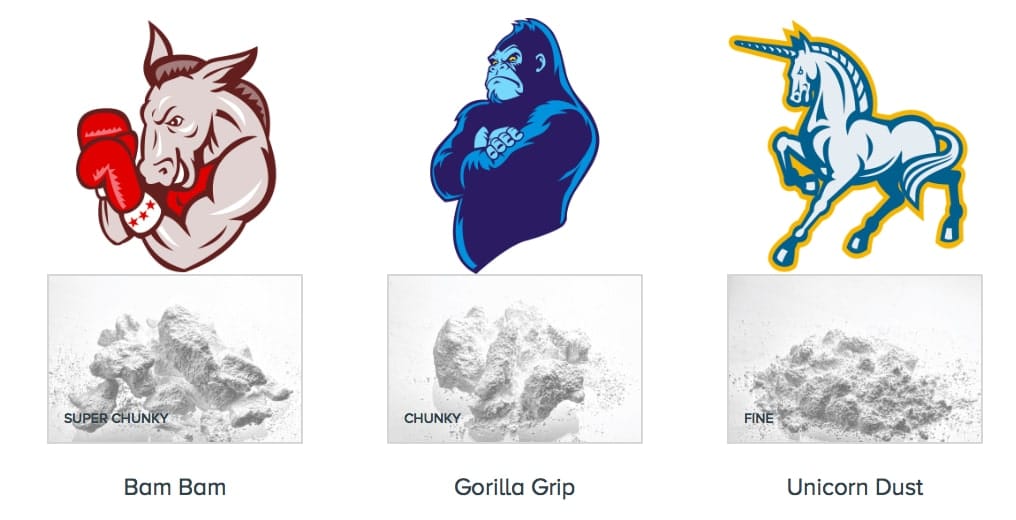
Hands down, I preferred Bam Bam to the other three. And I wished it was much chunkier.

A 7.5-ounce bag of Bam Bam
I like my block chalk because I can break off a few tangerine-sized pieces into my chalk bag, which gives me something to grab onto while climbing. With fine powder, it all collects at the bottom of the chalk bag and I think that it’s hard to get it on your palms. There’s nothing to grab onto. This is a bigger concern for sport climbing than it is for bouldering.
My bag of Bam Bam has, at largest, a few grape-sized pieces of chalk. But most of it is already crushed up into a fine powder.
I’m still wrestling with whether Friction Labs chalk, at (best case) more than twice what I now pay for Frank Endo, is worth the additional expense … I guess it comes back to that idea of what I’m willing to do (and spend) to give myself that extra 2 percent. After, that 2 percent makes all the difference …
.What do you think? Have you used Friction Labs? Do you think it’s worth it? What’s your favorite blend? Please post your comments here, and stay dry, my friends.

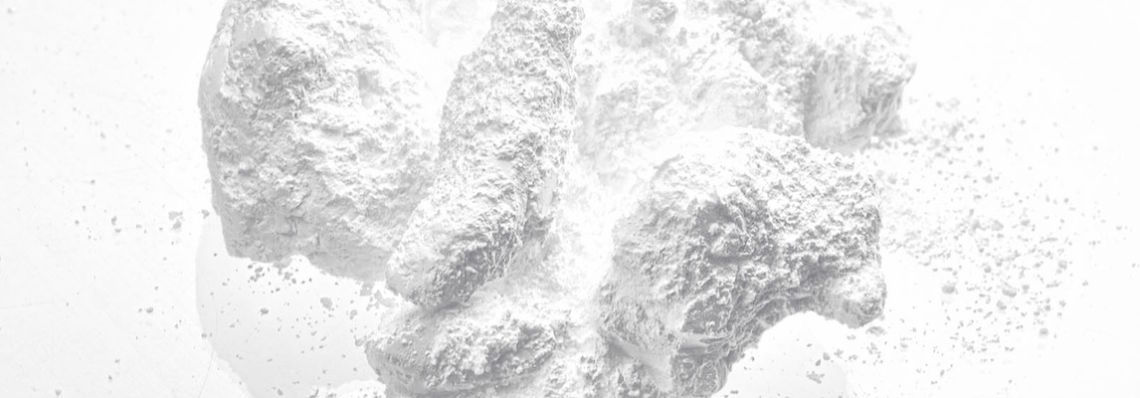
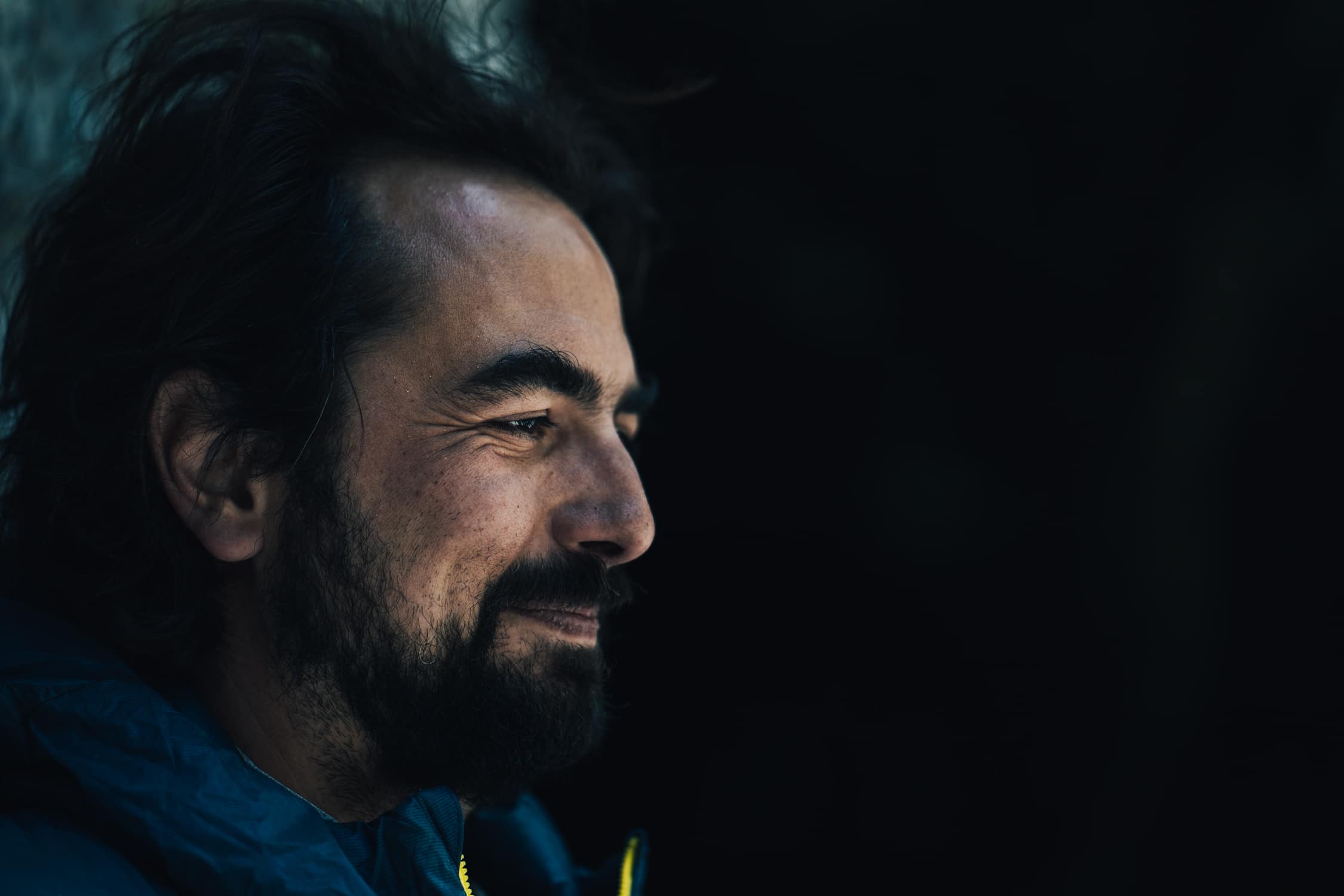

I have recently begun using Unicorn Dust and really like the chalk. I find that I coats very well and seems to stick around much longer then other chalks I have used, thus helping me to send with more frequency. The price point may seem a bit high at first but the way i look at it is if you are willing to spend $160 on shoes to climb just a but better, isn’t it worth spending a little more on chalk to do the same. I have been ultra impressed with both the chalk and the company as a whole. They have been very quick to answer questions and get out the chalk once it is order.
Keep Crushing!!
I started using friction labs a couple months ago and I’ll never consider any other chalk. This stuff legitimately dries your hands. That’s it. No film. No grease. Just dry. Check out my instagram for some pictures of the unicorn dust in action: fondling_rocks
I definitely consider Friction Labs to be the highest performance chalk out there! I started my climbing with blocks of Endo and than found myself using Bison chalk later on. Both brands offered different attributes to my climbing, but both brands I used tons of chalk for all my projects. The chalk either came off on the first move or left the skin on my hands peeling. With Friction Labs I use less and the chalk holds up great on longer bouldering problems where there no option to chalk up. My skin also peel less since the brand doesnt add any impurities that other chalk have. Im the first to say when it comes to the rubber on my shoes, I’m willing to spend lots of money for great performing shoes. So spending a little extra for the same performance on chalk that I’m using on my hands is priceless to me. Especially here in Red Rocks. My favorite blend is the Unicorn Dust. You can see the proof on Instantgram @frictionlabs and @idratherbebouldering
I have and still do use Friction Labs chalk. My hands were getting incredibly sweaty this summer while I was training at my local gym (especially on the higher walls), and it was becoming increasingly frustrating. I tried everything, including a liquid chalk a friend had mixed up. Though it helped at first, once it wore off it was back to square one. I had seen ads for Friction Labs and decided to give it a shot. The first day trying it, I decided to see how long one chalking could last. Turns out it could last me 3 extra long boulder problems, and lasted on my girlfriends hands for 8! (Her hands don’t sweat as much as mine do). Keep in mind this was summer, with temps outside pushing 90 degrees and an A/C system that was not cutting it. I am now a firm believer in this chalk, and totally willing to spend a little extra to give me the extra grip I need on my projects.
I also recently started using FrictionLabs chalk, Gorilla Grip is my blend of choice. It keeps my hands drier than anything else. I’d label myself a cheap person and this chalk is expensive when compared to other chalks, but cheap when compared to all my other climbing related gear. I think of it as buying a couple extra Starbucks each month. I’m also intrigued by their study that shows why their chalk works better. I’m sold.
I believe FrictionLab’s chalk is DEFINITELY worth the extra money! There is nothing better than having dry hands and feeling confident on your project! This chalk works better than any other chalk I have used, and I will never go back to climbing without it!
I believe FrictionLabs chalk is definitely worth the extra money. There is nothing better than having dry hands and feeling confident on your project! I have used a lot of other brands of chalk and nothing compares to the chalk from FrictionLabs.
After switching from metolious super chalk to friction labs im finally sending my longer boulder projects. I dont have the excuse anymore that i need more chalk part way through a climb!
Honestly, I haven’t even considered trying Friction Labs’ products out based solely on their social media campaign, specifically on Instagram. It seems they’re offering everyone and their grandma brand ambassadorship positions. I understand that social media is an effective way to promote brand awareness, but a company willing to represent themselves with so many non-elite-level climbers loses credibility in my eyes. It’s hard to take such a company seriously. It’s good to hear that they are putting out a quality product, though I’m not sure if I’m willing to drop the dough for it. Thanks for the write-up!
Mark, we’re sorry to hear that. One of the things we at FrictionLabs love most about climbing is how supportive and encouraging the climbing community is, regardless of ability. It’s part of what makes this sport so fun: whether you’re a first time climber or a pro, all that matters is that you try hard. We’re honored to get to support climbers in their successes – V2 or V15. And we’re honored that they want to represent us while they achieve them.
fuck yeah, I agree. I’m a newb, just a year into climbing and I absolutely love FL. So to hear it not just Puccio they’ve got, but other folks who just love rocks and getting on them, who only dream in their dreams about v14 makes me support them harder.
…after reading the Featured Comment, i’d really like to know how many of the commenters here (especially the ones mentioning instagram accounts) are “sponsored”…
Christopher, thanks for the question – we’re big believers in clarity and transparency. It looks like just 3 of the comments are from our Ambassadors, including the Instagram ones (which, by the way, we support – what does it mean to be an Ambassador if not a passionate fan who speaks up when given the opportunity?). But we’re glad you put “sponsored” in quotes, because that term definitely needs clarification – none of our Ambassadors get free chalk from us. Ambassadors (1) pay up front to join the program and (2) get 30% off 1 month of our chalk ONLY when they refer a friend to sign up with their promo code (and you’ll notice no one has posted a promo code here). So if the source of your question is because you’re wondering whether the commenters who are Ambassadors are actually paying full price when they say that the chalk is worth it – yes, they absolutely are, same as everybody else. They just happen to also be raving fans of our chalk – and if you read Andrew’s review, you know why.
Yeah, kudos to friction labs if all of these nice comments really are free and honest. If these reviewers are getting some sort of kickbacks, it’s only fair that they mention that in their comment.
I have a terrible sweaty palm when I start climbing. I usually make gymnast chalk a paste on my hands even if I wipe them off. I have been using friction labs chalk for a while now and I have never had an issue with sweaty or greasy palms since. I prefer either the unicorn dust or gorilla grip. I am the same way where I like to grab on to something in my bag so I made a chalk sock. That suits me well. I also found that a 2 ounces of friction labs chalk lasted me about as long as a 4.5 ounce bag of super chalk. So the price didn’t bother me. If I’m using about half the chalk to stay just as if not more sticky, I would pay more for that.
Great article
Greg Grierson here…Ohio local climber, friction labs ambassador, outdoor leadership instructor. I’m talking about increased bouldering friction in some of the less favorable conditions; The grippiest of grippiest, stickiest of the sticky, Unicorn Dust. I’ve sampled all three chalks in the past week and all tested within their selling points. You have low friction? BAM BAM will pack a punch capable of sticking even the chossiest of problems. Ready to wrestle rocks in a gym? Gorilla Grip is highly preferable for those greasy plastics. Above all though, As I’ve said before; Unicorn Dust is the fine grind for gritty climbs.
From one climber to the rest of you…Keah and Kevin are slayin’ it.
I first tried Friction Labs chalk in July and was immediately hooked! I noticed a big difference between their chalk and others that I have previously used. Friction Labs chalk kept my hands dry and I didn’t have to chalk up between climbs. I also like the fact that it’s delivered straight to my door. In the long run it does save me money and time that I would of spent driving to go buy chalk.
I received a sample pack from Friction
Labs and tested it compared to Mad Rock, Frank Endo, Metolius, Bison, J-Tree
minty stuff and Evolv. Every kid on my team has a different chalk so it was
fun to compare. I felt like a drug dealer handing out little baggies of chalk. So what’s the best chalk?… No clue? I like to let it rain
chalk and use chalk when I don’t even need it. After 20+ years of climbing and
using whatever chalk I had. I have never once thought “my chalk sucks”. Having
said that. Did I send a project or stick a hold better because of any certain
chalk? I don’t think so. I sent my project on the 50th try because I
needed 50 tries. I have a list of excuses, but that is just part of the game.
I do know that my team kids believe in
their chalk and it helps them because they believe it helps them. They say “it
is smoother or they like to break it up a certain way or it smells good, and
they believe it helps them, just like you might believe a certain pair of shoes
will help you when trying to unlock what is going to work for you. The mental
game is a big part of the game.
Does a certain brand last longer?
Maybe? But, I like to chalk up and I don’t ever want to not share my “special”
chalk because it cost to much, or think, “you just dumped $$$$ all over the
place”. I like Friction Lab chalk, it
feels good and it coats your hands nicely and feels refined. These guys did some real science to
make “better chalk”. So should you buy x brand chalk? Yes! If you will go climb,
and be willing to go play the game one more day and still have fun, then
it’s worth it. Maybe it will help you send your project and that is awesome!!!Maybe this is the magic mix to unlock the next level of climbing? Good job Friction Labs for stepping up the game.
While I can definitely “feel” the difference between Friction Labs and other brands, I didn’t feel that there was an appreciable real-world difference. This was after using Frank Endo side by side with Unicorn Dust for a day at Lincoln Lake. I felt “drier” after chalking up with the Unicorn Dust, but as soon as I pulled on to the boulders, both chalks seemed to perform the same. Perhaps the Friction Labs makes more of a difference on sport climbs where there is a longer contact period with the rock and chalk has to be reapplied more (or less) during the duration of the route.
Dude this chalk is awesome! I’ve been using it for 3 months now and I was a bit skeptical at first but my friend gave me a sample and I was blown away! I had just bought a brand-new bucket of chalk and once I got this I just gave the old stuff away. This stuff makes such a huge difference after using it, chalking up with anything else just kind of feels like you’re dipping your hands into dirt. And honestly it’s not that expensive because you don’t have to chalk up nearly as much! If you haven’t tried it yet you should at least give it a shot it’s definitely worth it!
It would be interesting to see some more science than, mag carb adsorbs water inside crystalline structure vs cal carb on outside – keeping hands drier, drier hands=better grip, therefore better climbing.
Is completely dry really the best for grip? Does the ‘slimy’ aspect of high cal carb chalks actually help the chalk stick to your hands better?
Why not carry out some COF testing with high Cal Carb content chalk vs high Mag Carb content chalk. Perhaps some testing as was done in the paper ‘Use of ‘chalk’ in rock climbing: sine qua non or myth?’. That paper found – “The counter-intuitive effect of chalk appears to be caused
by two independent factors. First, magnesium carbonate dries the skin, decreasing its compliance and hence
reducing the coefficient of friction. Secondly, magnesium carbonate creates a slippery granular layer.” Is that slippery granular layer actually worse with higher grade mag carbonate chalks?
I’d be more convinced if Friction “Labs” actually did some REAL science that relates to the actual application, rather than just purity testing and then taking a logical leap to drier=more friction. The comment on their site that they ‘use a proprietary process to create a high performance chalk with an extremely high MG:Ca ratio’ also kind of reeks of that typical sports protein supplement marketing. The reality is they buy a high grade mag carb in bulk from a either a manufacturer or distributor, and they blend it up with cheaper grades of chalk to produce their range of 3 products.
Buy it by the Kilo. 80 bucks/kilo. But way better than a 10oz bag in my opinion. its about 35oz. honestly, I don’t wanna put anything else on my hands. its like silky send power powder….
I have been using Unicorn Dust for a while until I won a boulder comp at the University of Arkansas, one of the small prizes given out was a 4oz bag of Asana White Dirt. I love the feeling of that chalk and it is considerably cheaper seeing as a 2 pound bag costs 24$. My question is how does the Unicorn Dust compare to the material in the White Dirt? Just from a feeling point of view it is considerably lighter and spreads just as well as the Unicorn Dust.
Just an FYI (event though this is a dated post), Frank endo and friction labs both purchase their magnesium carbonate from the same supplier in Taiwan; So not sure how you can feel a difference in the same product.
Maybe marketing hype – maybe difference is block vs powder?
I know, all chalk comes from the same mine in asia … but I FL does process the raw chalk (which is why you can’t get it in the blocks)
It’s from the same exact supplier – Yuncheng chemical. They most likely buy the blocks and use a pulverizer to make the differing textures.
That’s their processing…
it’s more complicated than that …
Yea, there’s the top secret process known as MARKETING….which is very important for both the company and the content generator when said content is on an ad supported website.
Chalk blocks are created by making a slurry of magnesium carbonate and water, compressing it into a block, then allowing it to dry. The only way FL or any other chalk manufacturer can produce chunky chalk is to start with a block and crushing it.
OK, but I’m telling you that there’s more to it than that.
andrewbisharat I do not agree
Actually no it’s not. They buy nugget and most likely process it with drill paddle. No secret sauces added.